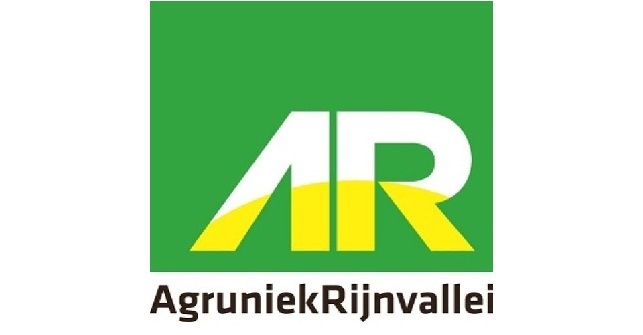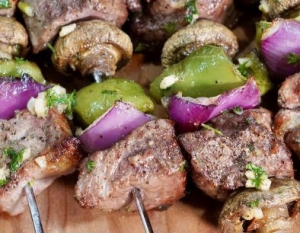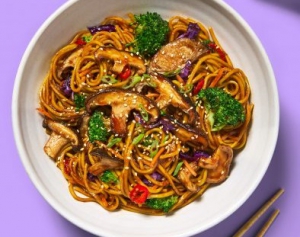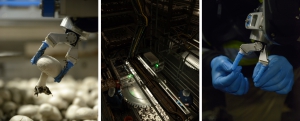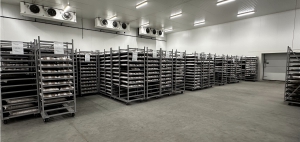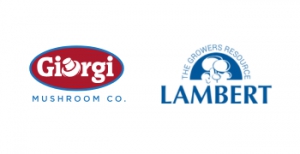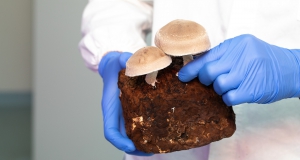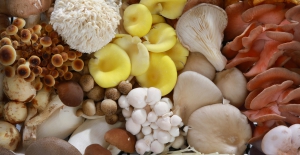
Mushroom Matter
Welcome on our platform. Why MUSHROOM MATTER? Because mushrooms play an important role in our lives as well in business. Our goal is to bring the world the very latest mushroom news with the upmost care to support the positioning of our beloved Mushroom.
Mycionics, a Canadian-based pioneer in advanced mushroom harvesting systems, is announcing the launch of its robotic mushroom harvesting and scanning system with South Mill Champs, one of North America’s largest mushroom farms.
A rigorous six-month pilot proved the market’s first economically viable solution to the industry’s pressing labour challenges. Employing a hybrid harvesting approach enabled by the Christiaens Group’s drawer infrastructure, this technology allows humans and robots to work side-by-side on centralized platforms. The method leverages humans for their skill, and robots for their precision and stamina. With two robotic arms, the system harvested 33% of the crop with quality exceeding human harvesting, while also providing real-time crop insights that optimize growing and harvest decisions.
“Having lived through the complexities of robotizing traditional mushroom farms, I am confident in this new hybrid approach,” said Stefan Glibetic, CEO of Mycionics. “Now validated by South Mill Champs’ commitment to this large-scale deployment, it marks a new era for mushroom production.”
Deployment at South Mill Champs will occur in two phases. Phase one, beginning July 2025, will implement Mycionics’ scanning and pointing technologies farm-wide. These are projected to enhance harvesting efficiency by 15% and increase crop yield by 4-8% through guided labour and precision picks. This phase also includes demonstrating Mycionics’ next-gen robotic system, capable of harvesting 75% of the crop through robotic picking, packing, sorting, and grading. Phase two will fully populate the farm with robotics in 2026.
Mycionics is poised to transform the industry beyond North America. Following South Mill Champs’ lead, several farms in Europe have committed to adopting the technology, signalling strong international interest and the broad applicability of Mycionics’ solutions.
For additional information, visit mycionics.com or contact This email address is being protected from spambots. You need JavaScript enabled to view it.
A few years ago, we visited the spawn facility in Venlo - back then still operating under the name Lambert Spawn. Much has changed since. Time for a renewed introduction. We spoke with Ies Hooglugt, site manager of the Venlo location, about technology, collaboration and Ecovative’s ambitions.
The moment you walk into Ecovative’s production site in Venlo, it’s clear: serious work is being done here to produce top-quality spawn. Since the American company Ecovative took over around 2.5 years ago, a lot has changed and improved.
“We’ve truly matured as an organization,” says Ies Hooglugt. “The technology, the processes, and the people have all grown significantly.”
Spawn as core business
The Venlo factory is a well-known name in the spawn industry, formerly operating under the Lambert Spawn brand. Today, about 90% of production is focused on mushroom spawn and 10% on so-called “non-mushroom” applications, such as leather alternatives and mycelium-based packaging.
“That market is still in development. Promising, but young,” says Hooglugt. “Our core business remains the production of mushroom spawn.”
Within that 90%, the split is approximately 80% Agaricus and 20% exotics. “A valuable addition. We see great potential there, and the results are promising.”
From grain to custom solutions
One of Ecovative Venlo’s distinguishing features lies in the substrate used for growing spawn. While many suppliers use standard grain and straw, Venlo decided to look further.
“We used to work exclusively with millet, but that’s not suitable for every mushroom species,” explains Hooglugt. In collaboration with Belgian partner Mycelia - known for its extensive knowledge of exotics - new carriers were developed: Blend and Speed Spawn.
“We tailor the substrate to the mushroom, not the other way around. This results in faster and more efficient colonization of the substrate.”
Strategic partnership with Mycelia
The collaboration with Mycelia is strategic and goes far beyond just substrate or inoculum.
“For exotics, we work together at the highest level,” Hooglugt explains. “Mycelia brings decades of experience and deep knowledge of exotic species, and we contribute our production expertise. It’s a close collaboration - from strain selection to final spawn production.
For Agaricus, we now produce our own inoculum in-house, but for exotics we consciously build on Mycelia’s strength.”
According to Hooglugt, the triangle is solid: the American parent company provides scientific power, Mycelia brings practical expertise, and Venlo contributes production knowledge.
“All of these elements complement each other perfectly.”
Quality first
The acquisition by Ecovative has raised the bar. Internal processes have been tightened, and quality systems optimized.
“The advanced and unique system we use to make spawn is fairly complex. It requires well-trained people,” says Hooglugt. “Fortunately, we have a strong and stable team here, with hardly any turnover. That’s quite exceptional in this sector.”
He likes to compare it to Formula 1: “You can have the best car, but without a skilled driver, you won’t win the race. And vice versa. Here, everything lines up — people, technology and processes.”
Testing and research
Ecovative leaves nothing to chance, as shown by its close cooperation with research institutes. Spawn is tested at Inagro in Belgium, and the company works with Wageningen University & Research (WUR).
“WUR recently developed 16 sporeless oyster mushroom strains,” says Hooglugt. “These are freely available to the market, with the exception of the Purati, which is an exclusive release by Mycelia. And we’re producing the spawn.”
Growth ambitions
Although exports are going well, there’s still room to grow in the Dutch market.
“We’d like to expand domestically,” says Hooglugt. At the same time, he sees the market evolving. “There’s consolidation happening, growers are scaling up, and so are suppliers. That’s exactly why having alternatives is becoming more important.
We notice growers are making more conscious decisions.”
A great example is an Italian Pholiota grower who felt too dependent on his regular supplier.
“He actively sought a solid alternative, and we succeeded together,” Hooglugt shares. “We developed a new solution collaboratively. That’s what we stand for: flexibility, customisation and quality. It gives growers more control over their own process.”
After our visit to Venlo, one thing is clear. Ecovative stands strong, both literally and figuratively. The team knows what it stands for, operations are tightly managed, and the vision is clear. Most of all, the door is open for growers who want to move forward.
Team Mushroom Matter
Giorgi Mushroom Co. Acquires L.F. Lambert Spawn Co.

Blandon, PA – July, 1 2025 – Giorgi Mushroom Co., a subsidiary of The Giorgi Companies, Inc. (Giorgi), a leader in the mushroom industry, is pleased to announce its acquisition of majority equity ownership in L.F. Lambert Spawn Co. (Lambert), a company renowned for its decades-long expertise in spawn production and agricultural innovation.
This acquisition marks a strategic step forward for Giorgi Mushroom Co. in enhancing its capabilities while also providing supply chain security for its customers.
By combining the resources and expertise of both companies, this partnership promises greater innovation, efficiency, and growth opportunities.
Mark Currie, President of Giorgi Mushroom Co., expressed his enthusiasm for the collaboration: “This is an exciting milestone for Giorgi Mushroom Co. as we join forces with L.F. Lambert Spawn Co. to deliver unparalleled quality and innovation in the mushroom industry. Together, we are poised to unlock new opportunities and set the bar even higher in meeting the needs of mushroom growers and consumers alike.”
Peter Giorgi, CEO of The Giorgi Companies added “We are thrilled to announce the acquisition of Lambert, a transaction that will be truly transformational and drive innovation and value for our customers and suppliers. We believe that Lambert will set new standards in our industry and drive our company towards an even brighter future.”
Scott McIntyre, VP of Commercial, of L.F. Lambert Spawn Co., echoed the sentiment: “The Lambert legacy is one rooted in excellence and innovation, and partnering with Giorgi Mushroom Co. ensures that this tradition will continue to thrive. We are eager to work together to build upon our shared values of quality and sustainability.”
Rick McIntyre, VP of Business Development, of L.F. Lambert Spawn Co., added: “This partnership represents a significant moment for both companies. By leveraging each other’s strengths, we can enhance our services, broaden our impact, and deliver even greater value to the mushroom industry.”
About Giorgi Mushroom Co.
Giorgi Mushroom Co. (GMC) is a vertically integrated, third-generation family-owned producer of fresh and processed mushrooms. GMC is located in Berks County, PA, with additional operations in Chester County, PA and Phoenix, AZ and a joint venture in Saltillo, Mexico and Texas.
SEBASTOPOL, Calif.--(BUSINESS WIRE)--LeafWorks, a trailblazing botanical genomics and testing company for natural products, today announced the release of its latest innovation: a suite of species-specific DNA tests for six of the most commercially important functional mushrooms—Lion’s Mane, Chaga, Turkey Tail, Shiitake, Cordyceps and Reishi.
Functional mushrooms are one of the fastest-growing categories in the natural products industry, with Lion’s Mane alone representing more than 25% of North American functional mushroom supplement sales in 2023. As consumer demand rises, so does the pressure on manufacturers to verify ingredient integrity, especially in global supply chains where mislabeling and adulteration are common.
To meet this growing need, LeafWorks® Mushroom Species DNA ID Tests provide fast, accurate mushroom identification in raw ingredients, blends and finished goods. These species-specific qPCR assays give natural products companies a practical and powerful new tool to support label claims, comply with 21 CFR Part 111, and ensure quality throughout the supply chain.
Please read the full article here.
From grower to frontrunner, the Dutch mushroom continues to grow
What once started in the 1950s with a smart combination of horticultural knowledge and a rock-solid infrastructure, has grown into a sector that now sets the tone in Europe: the Dutch mushroom industry. But the success story does not stop there. On the contrary, the sector is transforming at a rapid pace.
The smell of freshly picked mushrooms no longer betrays the whole story. Behind the scenes, the world of mushrooms has grown into a domain of innovation, sustainability and smart technology. It is no longer just about production; it is about value. About applications that go beyond the plate, and play a role in health, food innovation and circular processes.
Two men who experience this development up close are Rob Banken of Banken Champignons Groep and Jan Klerken Jr. of Scelta Mushrooms. As part of the European campaign ‘European mushrooms, hidden gems’, they talk about a sector in motion. A sector that knows its roots, but is not afraid to break new ground. “We build on decades of experience, but we are constantly looking ahead,” says Klerken Jr. “Sustainability and technological innovation go hand in hand with us.”
The Netherlands is considered an undisputed leader in Europe, and that is no coincidence. The shift from mass production to advanced applications is the result of years of investment, in people, machines and methods. Banken adds: “The strength of the Dutch sector lies in cooperation and in the willingness to innovate. That makes us flexible and future-proof.”
The mushroom as a hidden gem? In the Netherlands, it is increasingly coming into the spotlight, as a flavouring and as a symbol of progress.
Find a more extensive news item by EVmi here (in Dutch).
The Department of Trade and Industry (DTI) Guimaras has launched its first Shared Service Facility (SSF) of 2025, aimed at boosting mushroom processing capabilities for the Avila Farmers Agrarian Reform Cooperative (AFARCO) in Brgy. Avila, Buenavista, Guimaras.
The ceremonial turnover of the facility on June 23 was led by DTI Guimaras Officer-in-Charge Juvy Benliro, alongside Vice Mayor Cyril Beltran, Brgy. Captain Aster Brian Hiponia, AFARCO Chairman Alfredo Ferrer, Business Manager Teresita Martinez, and members of the cooperative.
The SSF includes specialized food-grade machinery for cleaning, slicing, dehydrating, and packaging oyster mushrooms, designed to improve productivity and maintain consistent product quality.
Please read the full article here.
Source: DailyGuardian
On the photo:
Key stakeholders, members of the AFARCO Cooperative, together with the technical and support staff of DTI Guimaras during the official launching of the Shared Service Facility (SSF) on Mushroom Processing.




